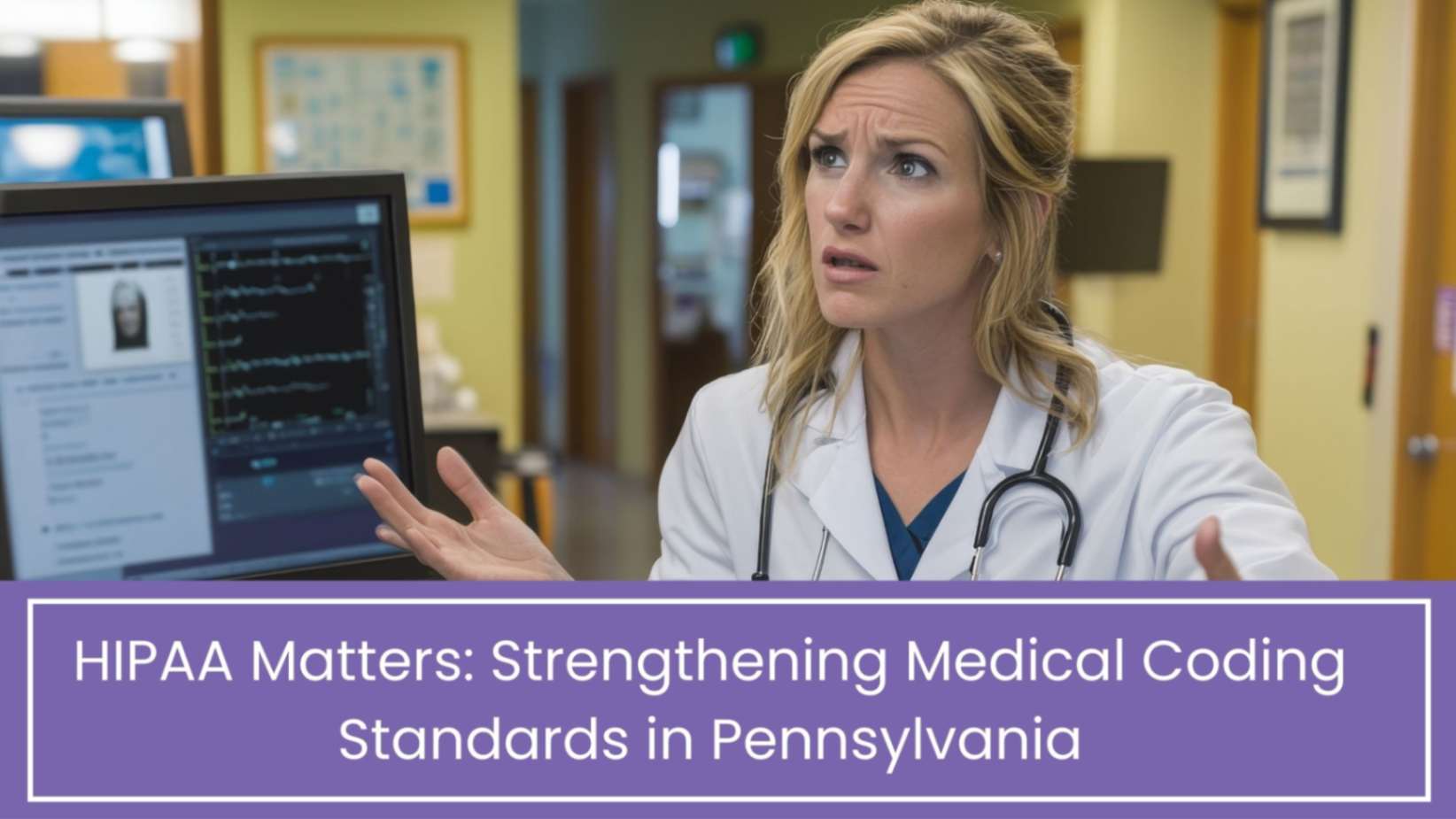How HIPAA Compliance Is Enforced in Medical Coding Across Pennsylvania
The healthcare sector moves quickly and has significant stakes. The most important resource in this setting is trust. Hospitals and clinics provide excellent medical care. Patients trust them to protect their private information. For a medical coder in Pennsylvania, that responsibility is a constant presence. Ensuring complete and absolute conformance to the Health Insurance Portability and Accountability Act, or HIPAA, is a crucial, fundamental purpose that goes beyond the work of converting complex medical services into billable codes.
Although it is a federal legislation, its implementation is a very local and genuine issue that affects every clinic, hospital, and billing business in the Keystone State. How HIPAA compliance is enforced in medical coding across pennsylvania actually look like in practice, and how is it actually implemented in Pennsylvania?
Table of Contents
Coder’s Unique Role in HIPAA
Protecting a patient’s Protected Health Information (PHI) is the fundamental goal of HIPAA. Their name, birthdate, medical data, insurance information, and, yes, even the codes on a medical claim are all included in this. This implies that a medical coder handles PHI directly on a daily basis.
A single day for a coder involves sifting through patient charts, identifying diagnoses (ICD-10 codes), and services rendered (CPT codes). Theoretically, an unauthorized person could learn about a sensitive medical condition from a miscoded diagnosis. An entire patient database could be vulnerable to a cyberattack due to a lack of security procedures. The involvement of every coder is crucial to a clinic’s security posture because this isn’t just a hypothetical situation. They are in charge of a great deal of data, and what they do has a direct effect on a clinic’s reputation and susceptibility.
Federal Watchdog and State-Level Support
Although the OCR is in charge of the major federal investigations, the Pennsylvania Attorney General’s office and other state-level agencies may also be involved in matters involving data breaches and consumer protection. In Pennsylvania, this enforcement is a collaborative effort. The Pennsylvania Attorney General’s office and other state-level agencies may be able to assist with consumer protection and data breach cases, even though the OCR is responsible for the majority of federal investigations.
Either a patient submits a complaint regarding a privacy infringement or the OCR starts a proactive audit, particularly if a healthcare business has reported a data breach, are the two usual ways that the enforcement process starts. There are several levels of penalties for non-compliance, ranging from $100 for a little, careless infraction to an astounding $1.5 million year for a serious, deliberate failure to comply. The message is unambiguous: patient privacy is a top priority for the administration.
Key Pillars of Compliance for Pennsylvania Coders
Compliance is a set of deeply rooted habits for Pennsylvania’s coders and billing specialists, not merely a checklist. Enforcement focuses on the following areas:
1.Technical Security: Coders’ digital systems need to be safe. This requires the adoption of encrypted software. Multi-factor authentication and strong passwords are essential. Strong security measures are required for any system handling PHI. To protect sensitive patient information, these measures are necessary. It’ll stop unauthorized access. The clinic must maintain a comprehensive audit trail. This trail should show who accessed patient information and when, to quickly identify and report any questionable conduct.
2.Administrative and physical safeguards are still crucial, even with digital medical coding services. They are important for ensuring security. Billing sheets and patient charts, containing PHI, should be stored securely. Ideally, these documents should be stored in locked cabinets. These records must be shredded when they are no longer needed. Proper disposal ensures they are destroyed. Clinics must administratively have well-defined, written rules and processes for managing patient data, and all staff members must get training on them.
3.Minimum Necessary Rule: This is one of the most fundamental principles for a coder. It means that when you are accessing patient information, you should only view the minimum amount of data required to complete your job. For instance, a coder working on a neurology claim does not need to look up a patient’s unrelated mental history. This concept lowers the likelihood of a breach. It fortifies a data protection culture.
4.Ongoing Education and Training: As threats to healthcare data security evolve, continuous training on HIPAA compliant medical coding services is crucial. All staff members, including coders, must get frequent, current training from Pennsylvania clinics. This ensures everyone is informed about the latest dangers, rules, and best practices. HIPAA training is crucial for coder professional growth. It is included in the curricula of professional certification organizations like the AAPC and AHIMA.
Culture of Compliance
There is more to Pennsylvania’s HIPAA enforcement than merely penalties and rules. It includes a wider variety of activities. The goal is to establish a culture. This culture prioritizes patient privacy. Every coder, billing specialist, and front desk staff member should understand their role in protecting patient data. Patient data must be protected by all staff members. This understanding strengthens the organization as a whole. The team practices together, but management leads the way. In addition to helping a clinic avoid expensive fines, this proactive strategy helps it establish a valued reputation for honesty and reliability in the community.
Conclusion:
HIPAA compliance is not only a legal need for a Top medical coders in Pennsylvania; it is also a fundamental duty that forms the basis of their entire position. The OCR-led and state-supported implementation of these regulations provides a strong reminder of patient privacy’s importance in healthcare. They emphasize the need to protect patient privacy in modern healthcare. Coders can ensure efficient data handling. They can also ensure data security by being vigilant. This includes adhering to the minimum necessary” principle. Continuous training is also required.
For medical coders in Pennsylvania, HIPAA compliance is more than just a rule; it’s a daily obligation linked to patient confidence. Coders are essential to data security since they deal with Protected Health Information (PHI) on a daily basis, from billing codes to diagnoses. Penalties range from minor fines to multimillion-dollar repercussions, and enforcement is carried out by Pennsylvania’s attorney general and the federal Office for Civil Rights (OCR). Strong technical protections including encryption, administrative procedures, and the minimum necessary requirement to restrict access to PHI are important compliance pillars. Coders stay ahead of changing risks thanks to ongoing training. Beyond fines, HIPAA promotes a compliance culture where safeguarding privacy builds confidence. Protecting PHI is essential to coders’ work and defines their professional ethics.
ALSO READ – Decoding CPT: Your Guide to Codes and Regulations 2024
Talk to Medical Billing Expert Today — Get a Free Demo Now!





